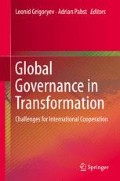Abstract
The modern system of global governance consists of a number of regimes in different issue-areas: security, finance, trade, investment and many other areas of global competition and cooperation. Despite a seemingly inexhaustible variety of those regimes, all of them may be classified by a finite (and small) number of governance structures. In our research, we defined seven types of governance structures, top–down: from global hierarchical coordinating bodies with powerful enforcement tools to a free international market. International actors based their choice of governance structures on a countable number of factors. Academic researchers working within the framework of transaction cost economics, primarily at the micro-level, investigated these factors.
This chapter seeks to identify the set of factors that played an important role in the choice of current modes of global governance, to trace their recent changes and to elucidate the economic rationale for the apparent or forecasted evolution of those governance structures. We focus our investigation on several global governance regimes—for energy, the environment and trade. Although these areas are transforming as the economic environment shifts, they nevertheless display patterns common to the general evolution of governance structures.
Access this chapter
Tax calculation will be finalised at checkout
Purchases are for personal use only
Notes
- 1.
Asset specificity—the degree to which an asset can be redeployed to alternative uses and by alternative users without sacrifice of productive value (Williamson 1991).
- 2.
It is still partially available under the umbrella of a much more sophisticated and updated database IEADB at https://iea.uoregon.edu/
References
Allee, T., & Elsig, M. (2016). Why do some international institutions contain strong dispute settlement provisions? New evidence from preferential trade agreements. The Review of International Organisations, 11(1), 89–120.
Bernauer, T., et al. (2013). Is there a “Depth versus Participation” dilemma in international cooperation? The Review of International Organisations, 8(4), 477–497.
BP. (2018, June). BP statistical review of world energy. Retrieved from https://www.bp.com/en/global/corporate/energy-economics/statistical-review-of-world-energy.html
Breitmeier, H., et al. (2006). Analyzing international environmental regimes: From case study to database. Cambridge, MA: The MIT Press.
Breitmeier, H., et al. (2011). The effectiveness of international environmental regimes: Comparing and contrasting findings from quantitative research. International Studies Review, 13(4), 579–605.
Colgan, J. D., et al. (2012). Punctuated equilibrium in the energy regime complex. The Review of International Organisations, 7(2), 117–143.
Furubotn, E. G., & Richter, R. (2005). Institutions and economic theory: The contribution of the new institutional economics. Ann Harbor, MI: University of Michigan Press.
Gereffi, G., et al. (2005). The governance of global value chains. Review of International Political Economy, 12(1), 78–104.
Goldthau, A., & Witte, J. M. (Eds.). (2010). Global energy governance: The new rules of the game. Washington, DC: Brookings Institution Press.
Grigoryev, L., & Kurdin, A. (2013). Mechanisms of global governance: Economic analysis [In Russian]. Voprosy Economiki, 7, 4–28.
Henisz, W. J., & Williamson, O. E. (1999). Comparative economic organisation—Within and between countries. Business and Politics, 1(3), 261–277.
Hooghe, L., et al. (2014). Designing third party dispute settlement for international organisations. In 7th Annual conference on the political economy of international organisations. Princeton University.
International Energy Agency (IEA). (2018). Oil information. Retrieved from http://data.iea.org/
Keohane, R. O., & Ostrom, E. (Eds.). (1994). Local commons and global interdependence. London: Sage.
Kirton, J., et al. (2018). G7/8 conclusions on energy, 1975–2017. Retrieved from www.g7.utoronto.ca/conclusions/energy.pdf
Koremenos, B., & Betz, T. (2013). The design of dispute settlement procedures in international agreements. In J. L. Dunoff & M. A. Pollack (Eds.), Interdisciplinary perspectives on international law and international relations: The state of the art (pp. 371–393). New York: Cambridge University Press.
Lesage, D., et al. (2010). Global energy policy in a multipolar world. Aldershot: Ashgate.
Marcoux, C. (2009). Institutional flexibility in the design of multilateral environmental agreements. Conflict Management and Peace Science, 26(2), 209–228.
Ménard, C., et al. (2018). Addressing the policy-implementation gaps in water services: The key role of meso-institutions. Water International, 43(1), 13–33.
Miles, E. L., et al. (2001). Environmental regime effectiveness: Confronting theory with evidence. Cambridge: MIT Press.
Rodrik, D. (2001). The global governance of trade: As if development really mattered. Report submitted to the UNDP. Retrieved from https://drodrik.scholar.harvard.edu/files/dani-rodrik/files/global-governance-of-trade.pdf
Saussier, S., & Yvrande-Billon, A. (2007). Economie des coûts de transaction. Paris: La Découverte.
Stiglitz, J., & Kaldor, M. (2013). The quest for security: Protection without protectionism and the challenge of global governance. New York: Columbia University Press.
Van de Graaf, T., & Colgan, J. (2016). Global energy governance: A review and research agenda. Palgrave Communications, 2, 15047.
Victor, D. G., et al. (2012). Oil and governance. Cambridge: Cambridge University Press.
Weiss, T. G. (2013). Global governance: Why? what? whither? Cambridge: Polity Press.
Weiss, T. G., & Wilkinson, R. (2014). Rethinking global governance? Complexity, authority, power, change. International Studies Quarterly, 58(1), 207–215.
Williamson, O. E. (1991). Comparative economic organisation: The analysis of discrete structural alternatives. Administrative Science Quarterly, 36(2), 269–296.
Williamson, O. E. (1998). Transaction cost economics: How it works; where it is headed. De Economist, 146(1), 23–58.
Yergin, D. (1991). The prize: The epic quest for money, oil, and power. New York: Simon & Schuster.
Young, O. R. (2011). Effectiveness of international environmental regimes: Existing knowledge, cutting-edge themes, and research strategies. Proceedings of the National Academy of Sciences, 108(50), 19853–19860.
Author information
Authors and Affiliations
Corresponding author
Editor information
Editors and Affiliations
Rights and permissions
Copyright information
© 2020 Springer Nature Switzerland AG
About this chapter
Cite this chapter
Kurdin, A. (2020). Empirical Investigation into Economic Fundamentals of Global Governance Structures. In: Grigoryev, L., Pabst, A. (eds) Global Governance in Transformation. Springer, Cham. https://doi.org/10.1007/978-3-030-23092-0_14
Download citation
DOI: https://doi.org/10.1007/978-3-030-23092-0_14
Published:
Publisher Name: Springer, Cham
Print ISBN: 978-3-030-23091-3
Online ISBN: 978-3-030-23092-0
eBook Packages: Political Science and International StudiesPolitical Science and International Studies (R0)

